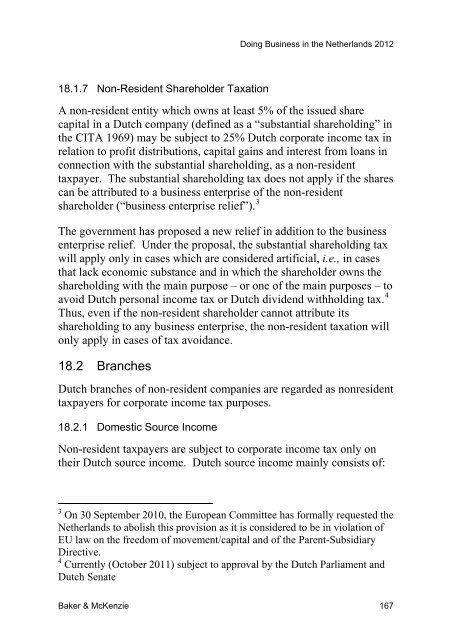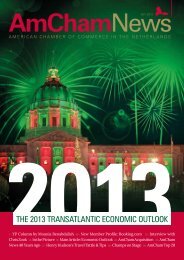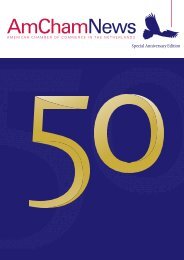Doing Business in the Netherlands 2012 - American Chamber of ...
Doing Business in the Netherlands 2012 - American Chamber of ...
Doing Business in the Netherlands 2012 - American Chamber of ...
You also want an ePaper? Increase the reach of your titles
YUMPU automatically turns print PDFs into web optimized ePapers that Google loves.
18.1.7 Non-Resident Shareholder Taxation<br />
<strong>Do<strong>in</strong>g</strong> <strong>Bus<strong>in</strong>ess</strong> <strong>in</strong> <strong>the</strong> Ne<strong>the</strong>rlands <strong>2012</strong><br />
A non-resident entity which owns at least 5% <strong>of</strong> <strong>the</strong> issued share<br />
capital <strong>in</strong> a Dutch company (def<strong>in</strong>ed as a “substantial sharehold<strong>in</strong>g” <strong>in</strong><br />
<strong>the</strong> CITA 1969) may be subject to 25% Dutch corporate <strong>in</strong>come tax <strong>in</strong><br />
relation to pr<strong>of</strong>it distributions, capital ga<strong>in</strong>s and <strong>in</strong>terest from loans <strong>in</strong><br />
connection with <strong>the</strong> substantial sharehold<strong>in</strong>g, as a non-resident<br />
taxpayer. The substantial sharehold<strong>in</strong>g tax does not apply if <strong>the</strong> shares<br />
can be attributed to a bus<strong>in</strong>ess enterprise <strong>of</strong> <strong>the</strong> non-resident<br />
shareholder (“bus<strong>in</strong>ess enterprise relief”). 3<br />
The government has proposed a new relief <strong>in</strong> addition to <strong>the</strong> bus<strong>in</strong>ess<br />
enterprise relief. Under <strong>the</strong> proposal, <strong>the</strong> substantial sharehold<strong>in</strong>g tax<br />
will apply only <strong>in</strong> cases which are considered artificial, i.e., <strong>in</strong> cases<br />
that lack economic substance and <strong>in</strong> which <strong>the</strong> shareholder owns <strong>the</strong><br />
sharehold<strong>in</strong>g with <strong>the</strong> ma<strong>in</strong> purpose – or one <strong>of</strong> <strong>the</strong> ma<strong>in</strong> purposes – to<br />
avoid Dutch personal <strong>in</strong>come tax or Dutch dividend withhold<strong>in</strong>g tax. 4<br />
Thus, even if <strong>the</strong> non-resident shareholder cannot attribute its<br />
sharehold<strong>in</strong>g to any bus<strong>in</strong>ess enterprise, <strong>the</strong> non-resident taxation will<br />
only apply <strong>in</strong> cases <strong>of</strong> tax avoidance.<br />
18.2 Branches<br />
Dutch branches <strong>of</strong> non-resident companies are regarded as nonresident<br />
taxpayers for corporate <strong>in</strong>come tax purposes.<br />
18.2.1 Domestic Source Income<br />
Non-resident taxpayers are subject to corporate <strong>in</strong>come tax only on<br />
<strong>the</strong>ir Dutch source <strong>in</strong>come. Dutch source <strong>in</strong>come ma<strong>in</strong>ly consists <strong>of</strong>:<br />
3<br />
On 30 September 2010, <strong>the</strong> European Committee has formally requested <strong>the</strong><br />
Ne<strong>the</strong>rlands to abolish this provision as it is considered to be <strong>in</strong> violation <strong>of</strong><br />
EU law on <strong>the</strong> freedom <strong>of</strong> movement/capital and <strong>of</strong> <strong>the</strong> Parent-Subsidiary<br />
Directive.<br />
4<br />
Currently (October 2011) subject to approval by <strong>the</strong> Dutch Parliament and<br />
Dutch Senate<br />
Baker & McKenzie 167





![912.025 AmCham News [1] - American Chamber of Commerce in ...](https://img.yumpu.com/9328612/1/190x127/912025-amcham-news-1-american-chamber-of-commerce-in-.jpg?quality=85)

